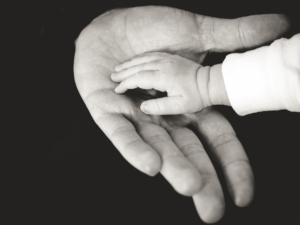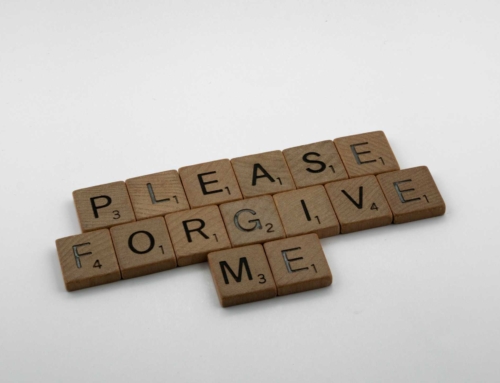A parent has the huge job of nurturing another human being and preparing them for life. Parenting is a task that never quite ends and, in some seasons, feels more thankless and draining than rewarding or encouraging.
 Being a parent changes over time as your children grow and enter different stages of life. In this way, parenting a newborn is different from parenting a teenager or a young adult, but you’re still a parent and occupy that unique role in your child’s life.
Being a parent changes over time as your children grow and enter different stages of life. In this way, parenting a newborn is different from parenting a teenager or a young adult, but you’re still a parent and occupy that unique role in your child’s life.
Parents will do whatever they can to protect their children and help them thrive in a world that isn’t always friendly or hospitable. This protective instinct is good. Sometimes, however, even a good thing can become problematic if it’s overdone or inappropriate in a particular context or developmental phase.
When it comes to parenting, it’s one thing to try and protect your children, but another to be overprotective to the point of attempting the impossible task of removing all risks from life. Parental codependency is how a good thing can become harmful.
What is parental codependency?
Human beings are mutually interdependent, and there is a very real sense in which we all need each other for our lives to flourish and reach our fullest potential. This is a God-created aspect of being human. We see this when God created a man and a woman to be together in the Garden of Eden and declared, “it is not good that the man should be alone…” (Genesis 2:18a). In as much as this is true, there are levels of dependence that go beyond this and are unhealthy.
If one person needs another to the point where they cannot function without the other person, that can be problematic. If the other person longs to be needed and pursues that to the detriment of their own necessities, it describes codependency.
Parental codependency is when this unhealthy form of dependence exists between a parent and their child. To be sure, when a child is a newborn and for several years after, they need their parents for just about everything, and parents would be neglecting their duty not to meet those needs.
As the child grows up, they should become better able at meeting their own needs, and the parent should allow that child to take on more responsibility for themselves. Unless there are circumstances such as serious developmental challenges, a child should not remain dependent on their parents, and the parents should not need to be needed by their children.
Parental codependency names an unhealthy pattern of responsive and coping behavior. When the parent has such an extreme focus on their child’s well-being that it becomes excessive, caretaking can undermine the well-being of both the parent and child.
Signs of parental codependency.
 Parenting requires giving of oneself, and it’s easy to miss the signs of codependency because it can be mistaken for good parenting and looking out for your child. No one wants to see their child going through a tough time, and codependent behaviors seem like the loving response to that. However, despite appearances, parental codependency is detrimental to the parent and the child.
Parenting requires giving of oneself, and it’s easy to miss the signs of codependency because it can be mistaken for good parenting and looking out for your child. No one wants to see their child going through a tough time, and codependent behaviors seem like the loving response to that. However, despite appearances, parental codependency is detrimental to the parent and the child.
Some of the signs of parental codependency are as follows:
Neglect self-care to take care of your child’s needs when they can take care of them on their own.
The early years of a child’s life can wreak havoc on many aspects of self-care such as sleep, having time to prepare healthy meals, and so on. Even then, it’s important to take time to take care of yourself. When your child gets older, if you neglect self-care because your child needs something, that may be a sign of trouble.
If you find yourself repeatedly canceling a date with your spouse or time at the gym because your grown child locked themselves out of their apartment or needs you to get something for them, you’re probably doing too much and need to step back.
Ignoring other relationships.
If you’re a codependent parent, your primary focus is on your child, and you may believe that you need to be available 24/7 for your child. The likely result of this hyperfocus is that your other relationships will suffer, and the first relationship that’ll likely suffer is your relationship with your partner.
Feeling responsible for your child, and desiring control over them.
For a codependent parent, the end goal is to have control so that their child doesn’t get hurt, doesn’t make wrong choices, and essentially lives life the way their parent wants them to. Control is the other side of being needed. This leads to being overly invested in the lives of your children, feeling responsible for your child’s feelings, and taking the blame for your child’s struggles instead of letting them be accountable for themselves.
Low self-esteem.
Connected to the above, codependent parents often have low self-esteem because their self-esteem is rooted in and dependent on their child. Thus, if their child is happy, they’re happy about themselves, and if their child is troubled, they also feel troubled.
Being emotionally manipulative.
Another sign of codependent parenting is that the parent manipulates their child. Often, the parent will feel victimized, and use guilt as a weapon to affect the behavior of their child. If the child attempts to assert independence, it is read and treated as a rejection of the parent and their love. In this way, the parent retains control over the child and continues to occupy a central role in their child’s life.
Becoming obsessed with the problems of others.
This may manifest as over-involvement in the child’s life and attempting to resolve problems for them. It can also show in focusing excessively on the problems of other people, whether those are friends, family members, or even strangers. They long to be needed.
Not listening well, and never being in the wrong.
 Codependent parents often struggle to listen to their child’s feelings and problems. It can be hard for the parent to learn about their child’s personality and way of being in the world. Rather, the desire to control overrides the child’s desire to be independent, and every situation becomes a threat to the parent’s authority.
Codependent parents often struggle to listen to their child’s feelings and problems. It can be hard for the parent to learn about their child’s personality and way of being in the world. Rather, the desire to control overrides the child’s desire to be independent, and every situation becomes a threat to the parent’s authority.
If the codependent parent’s advice doesn’t pan out because they were wrong, one sign of this codependency is that the codependent parent will not apologize when they’re wrong. If they do, it will come off as feeling insincere and forced.
Having poor boundaries.
Codependent parents may have a hard time disciplining and saying “No” to their children. Rather than risk the ire or displeasure of their children, a codependent parent will not enforce boundaries. Research constantly shows that structure and boundaries is helpful for children’s growth.
Parental codependency is problematic because it can teach a child that their feelings and needs are unimportant, and it robs the child of the chance to develop their personality and sense of identity through their own choices.
The underlying causes of parental codependency.
Part of where parental codependency comes from is not recognizing how the different stages in a child’s life require different forms of parenting, and that pain and struggle aren’t always bad things, but necessary for growth.
The protective instinct and the need to be needed are hard to wean oneself from. A parent needs to know when to say “No” and risk being seen as unkind or unloving by their child. In fact, saying “no” is sometimes the most loving thing to do!
Codependent behavior is learned, and often the codependent parent wants to get from their child the love and attention they didn’t receive from their parents. This is one reason why most codependent parents expect a level of devotion and love from their children that is unhealthy and unnatural. They are trying to make up for what was lacking in other relationships.
Lastly, parental codependency also stems from not knowing the difference between supporting and enabling. Support is coming alongside someone when they can’t do something for themselves, and help temporarily until support is no longer needed. Enabling, on the other hand, does for a loved one what they can and should be doing for themselves, and it allows the status quo, even a harmful status quo, to persist.
 Parents ought to support their children but allow them to take responsibility for their own lives. Relieving them of pain and stepping in to fix their problems may seem like a convenient remedy now, but in the long term, it won’t be for their good. Parents need to look beyond their instincts and seek the ultimate good of their children.
Parents ought to support their children but allow them to take responsibility for their own lives. Relieving them of pain and stepping in to fix their problems may seem like a convenient remedy now, but in the long term, it won’t be for their good. Parents need to look beyond their instincts and seek the ultimate good of their children.
In his well-known book The Four Loves, C.S. Lewis wrote about this, saying:
The maternal instinct . . . is a Gift-love, but one that needs to give; therefore needs to be needed. But the proper aim of giving is to put the recipient in a state where he no longer needs our gift. We feed children in order that they may soon be able to feed themselves; we teach them in order that they may soon not need our teaching. Thus a heavy task is laid upon this Gift-love. It must work toward its own abdication. We must aim at making ourselves superfluous. The hour when we can say “They need me no longer” should be our reward. But the instinct, simply in its own nature, has no power to fulfil this law. The instinct desires the good of its object, but not simply; only the good it can itself give. A much higher love – a love which desires the good of the object as such, from whatever source that good comes – must step in and help or tame the instinct before it can make the abdication. – C.S. Lewis
Healing from codependency.
As with any issue, the first step to working through it is to recognize its presence and own that it truly is problematic. Parental codependency seems like a reasonable and loving thing to do, but it ultimately hurts you and your child. You will likely need to make apologies to your child and other significant people in your life for the harm your codependent behavior caused them.
If you’re a codependent parent, it is important to put the following in place:
Practice self-care. Instead of relying on your child to take care of your needs, take steps to meet your own needs.
Step back and create room. Take a step back and allow your child the independence they need to solve age-appropriate challenges. They need this practice to grow as people and to develop self-confidence in their problem-solving skills. This will also require you to listen well, giving your child your full attention when they express themselves, so that you can respect their boundaries.
Get professional help. Lastly, it is helpful for you to dedicate time to counseling sessions with a licensed therapist who has experience with codependency or addiction therapy. They can help you discover why you engage in codependent behaviors and how to begin undoing the damage caused in your child’s life. Reach out and find the help of a counselor to work through your codependent behavior and restore a healthy parent-child relationship.
“Parent and Child Silhouette”, Courtesy of Ante Hamersmit, Unsplash.com, CC0 License; “Forest Walk” Courtesy of James Wheeler, Unsplash.com, CC0 License; “Hand in Hand”, Courtesy of Liane Metzler, Unsplash.com, CC0 License; “Reaching Out”, Courtesy of Youssef Naddam, Unsplash.com, CC0 License









